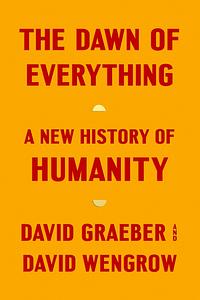Take a photo of a barcode or cover
challenging
informative
inspiring
reflective
slow-paced
An intriguing book which covers a lot of ground. It seems to digress quite a lot without ever reaching conclusions. I’m not sure I fully agree with every premise assumed, but it certainly does a good job of making its case. It did frequently feel like the conclusions were a large reach from the data, but with what data is presented there can only be reaching at times.
Big reading slump and just didn’t feel like reading it at the time
Gonna circle back to it
Gonna circle back to it
slow-paced
Finally finished this 24hr audiobook fml. Was disappointed overall though tbh i zoned out a lot.
funny
hopeful
informative
medium-paced
Loved it—I feel like the first few chapters were the strongest. It’s a huge book and I was zooming through it like a novel. Great piece of nonfiction and makes me want to explore historical/anthropological stuff more. And the ethos of it—that humans have, meaning that they still can—shape and change the political formations of their lives. Their definitions of freedom were also very interesting.
informative
reflective
slow-paced
interesting but DENSE prob wouldn’t recommend
challenging
funny
hopeful
informative
inspiring
reflective
relaxing
slow-paced
5 stars two reasons:
1) hoes mad
2) abolish border
in all seriousness i think this book is best treated as a polemic (i know nothing about archaeology and barely anything about anthropology and some people who seem to say the sources are misused), and it’s a damn good polemic.
or: a good way of thinking about history that i can use to piss off men
here is a poem.
my review of the dawn of everything: a poem
1) hoes mad
2) abolish border
in all seriousness i think this book is best treated as a polemic (i know nothing about archaeology and barely anything about anthropology and some people who seem to say the sources are misused), and it’s a damn good polemic.
or: a good way of thinking about history that i can use to piss off men
here is a poem.
my review of the dawn of everything: a poem
Time does not exist for us, it happens to us. Or rather upon us.
To survive we must defy the very laws of nature,
defy nature:
strip the casing from an innocent green stalk for brick,
castrate plant life and fling it into piles and bury its children.
And then from the seedling coffins, wrestle life from the earth with mud-soaked fists,
and for all that work, we are called a force immeasurable,
an endless ebb
not woman, but history,
immemorial
There are no guns here, but there are fists and hair and teeth
and tiny, swelling statues,
(now a subject of debate).
And in a heap of it all,
over layers of rubble and concrete glaze,
I am
here. From a seedling coffin
upon its afterbirth, no,
on its leg stretched out over its heart,
crushed,
splattering everywhere, and then a rust smear
lost to porous brick
and the fingerprints of the tiny hands who formed it.
And we go!
Fascinating cover-to-cover. Made me think a lot throughout about what my default assumptions about what prehistorical societies were - which I think was pretty much that we existed in small egalitarian bands. Even though if I thought about it I probably would have said this wasn’t exactly true, I wouldn’t have had any basis for an alternative explanation. This period of history is typically brushed over as “here are some highlights, but really nothing much of importance happened”. Not only does this book present tons of evidence to the contrary, but prompts us to question why we consider certain things more “important” than others.
When the defining view of history since the Enlightenment has been that all of history was simply the prelude to the modern world (which, of course, was the only, inevitable result for humanity) it becomes easy to dismiss things that don’t fit into that evolutionary way of thinking as bumps in the road. What Graeber and Wengrow ask us to consider is that possibly, far from “bumps”, what if these really present alternatives - roads not taken. The central question of this book is not “How did social inequality arise?”, but “How did we become stuck?”.
As some reviews mention, there is a fair amount of speculation going on here, some of which I found more convincing than others. However, the fact that it is speculation doesn’t matter so much as the fact that it is *plausible* speculation. As they mention several times, it is really impossible to determine exactly what was going on in prehistoric societies, and some amount of speculation is present in any reading of the evidence. However, as they go on to say, typically that speculation is geared in one direction, confirming the evolutionary view of civilization, when in fact there’s no real reason beyond inertia to believe that to be true. What they ask here is why can’t we speculate the other way, and assume that people weren’t in some dreamlike existence of egalitarian bands prior to the agricultural revolution, or that perhaps history could have (and in fact had for some time) played out in ways that didn’t lead to the rise of top-down structures of administration and control?
When the defining view of history since the Enlightenment has been that all of history was simply the prelude to the modern world (which, of course, was the only, inevitable result for humanity) it becomes easy to dismiss things that don’t fit into that evolutionary way of thinking as bumps in the road. What Graeber and Wengrow ask us to consider is that possibly, far from “bumps”, what if these really present alternatives - roads not taken. The central question of this book is not “How did social inequality arise?”, but “How did we become stuck?”.
As some reviews mention, there is a fair amount of speculation going on here, some of which I found more convincing than others. However, the fact that it is speculation doesn’t matter so much as the fact that it is *plausible* speculation. As they mention several times, it is really impossible to determine exactly what was going on in prehistoric societies, and some amount of speculation is present in any reading of the evidence. However, as they go on to say, typically that speculation is geared in one direction, confirming the evolutionary view of civilization, when in fact there’s no real reason beyond inertia to believe that to be true. What they ask here is why can’t we speculate the other way, and assume that people weren’t in some dreamlike existence of egalitarian bands prior to the agricultural revolution, or that perhaps history could have (and in fact had for some time) played out in ways that didn’t lead to the rise of top-down structures of administration and control?
adventurous
challenging
informative
inspiring
slow-paced
Like other intellectual refreshers, this book allows us to assess the present and discard past mythologies. It’s time to do some house cleaning, and we have a big house.





